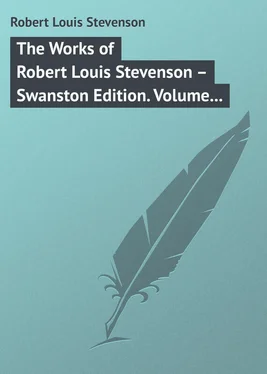Robert Stevenson - The Works of Robert Louis Stevenson – Swanston Edition. Volume 24
Здесь есть возможность читать онлайн «Robert Stevenson - The Works of Robert Louis Stevenson – Swanston Edition. Volume 24» — ознакомительный отрывок электронной книги совершенно бесплатно, а после прочтения отрывка купить полную версию. В некоторых случаях можно слушать аудио, скачать через торрент в формате fb2 и присутствует краткое содержание. Жанр: foreign_prose, на английском языке. Описание произведения, (предисловие) а так же отзывы посетителей доступны на портале библиотеки ЛибКат.
- Название:The Works of Robert Louis Stevenson – Swanston Edition. Volume 24
- Автор:
- Жанр:
- Год:неизвестен
- ISBN:нет данных
- Рейтинг книги:3 / 5. Голосов: 1
-
Избранное:Добавить в избранное
- Отзывы:
-
Ваша оценка:
- 60
- 1
- 2
- 3
- 4
- 5
The Works of Robert Louis Stevenson – Swanston Edition. Volume 24: краткое содержание, описание и аннотация
Предлагаем к чтению аннотацию, описание, краткое содержание или предисловие (зависит от того, что написал сам автор книги «The Works of Robert Louis Stevenson – Swanston Edition. Volume 24»). Если вы не нашли необходимую информацию о книге — напишите в комментариях, мы постараемся отыскать её.
The Works of Robert Louis Stevenson – Swanston Edition. Volume 24 — читать онлайн ознакомительный отрывок
Ниже представлен текст книги, разбитый по страницам. Система сохранения места последней прочитанной страницы, позволяет с удобством читать онлайн бесплатно книгу «The Works of Robert Louis Stevenson – Swanston Edition. Volume 24», без необходимости каждый раз заново искать на чём Вы остановились. Поставьте закладку, и сможете в любой момент перейти на страницу, на которой закончили чтение.
Интервал:
Закладка:
Stevenson Robert Louis
The Works of Robert Louis Stevenson – Swanston Edition, Vol. 24
THE LETTERS OF ROBERT LOUIS STEVENSON
1882-1890
VII
THE RIVIERA AGAIN – MARSEILLES AND HYÈRES
In the two years and odd months since his return from California, Stevenson had made no solid gain of health. His winters, and especially his second winter, at Davos had seemed to do him much temporary good; but during the summers in Scotland he had lost as much as he had gained, or more. Loving the Mediterranean shores of France from of old, he now made up his mind to try them once again.
As the ways and restrictions of a settled invalid were repugnant to Stevenson’s character and instincts, so were the life and society of a regular invalid station depressing and uncongenial to him. He determined, accordingly, to avoid settling in one of these, and hoped to find a suitable climate and habitation that should be near, though not in, some centre of the active and ordinary life of man, with accessible markets, libraries, and other resources. In September 1882 he started with his cousin Mr. R. A. M. Stevenson in search of a new home, and thought first of trying the Languedoc coast, a region new to him. At Montpellier, he was laid up again with a bad bout of his lung troubles; and, the doctor not recommending him to stay, returned to Marseilles. Here he was rejoined by his wife, and after a few days’ exploration in the neighbourhood they lighted on what seemed exactly the domicile they wanted. This was a roomy and attractive enough house and garden called the Campagne Defli, near the manufacturing suburb of St. Marcel, in a sheltered position in full view of the shapely coastward hills. By the third week in October they were installed, and in eager hopes of pleasant days to come and a return to working health. These hopes were not realised. Week after week went on, and the hemorrhages and fits of fever and exhaustion did not diminish. Work, except occasional verses, and a part of the story called The Treasure of Franchard , would not flow, and the time had to be whiled away with games of patience and other resources of the sick man. Nearly two months were thus passed; during the whole of one of them Stevenson had not been able to go beyond the garden; and by Christmas he had to face the fact that the air of the place was tainted. An epidemic of fever, due to some defect of drainage, broke out, and it became clear that this could be no home for Stevenson. Accordingly, at his wife’s instance, though having scarce the strength to travel, he left suddenly for Nice, she staying behind to pack their chattels and wind up their affairs and responsibilities as well as might be. Various misadventures, miscarriages of telegrams, journeys taken at cross purposes and the like, making existence uncomfortably dramatic at the moment, caused the couple to believe for a while that they had fairly lost each other. Mrs. Stevenson allows me to print a letter from herself to Mr. J. A. Symonds vividly relating these predicaments (see p. 11 foll.). At last, in the course of January, they came safely together at Marseilles, and next made a few weeks’ stay at Nice, where Stevenson’s health quickly mended. Thence they returned as far as Hyères. Staying here through the greater part of February, at the Hôtel des Îles d’Or, and finding the place to their liking, they cast about once more for a resting-place, and were this time successful.
The house chosen by the Stevensons at Hyères was not near the sea, but inland, on the road above the old town and beneath the ruins of the castle. The Chalet La Solitude it was called; a cramped but habitable cottage built in the Swiss manner, with a pleasant strip of garden, and a view and situation hardly to be bettered. Here he and his family lived for the next sixteen months (March 1883 to July 1884). To the first part of this period he often afterwards referred as the happiest time of his life. His malady remained quiescent enough to afford, at least to his own buoyant spirit, a strong hope of ultimate recovery. He delighted in his surroundings, and realised for the first time the joys of a true home of his own. The last shadow of a cloud between himself and his parents had long passed away; and towards his father, now in declining health, and often suffering from moods of constitutional depression, the son begins on his part to assume, how touchingly and tenderly will be seen from the following letters, a quasi-paternal attitude of encouragement and monition. At the same time his work on the completion of the Silverado Squatters , on Prince Otto , the Child’s Garden of Verses (for which his own name was Penny Whistles ), on the Black Arrow (designated hereinafter, on account of its Old English dialect, as “tushery”), and other undertakings prospered well. In the autumn the publication of Treasure Island in book form brought with it the first breath of popular applause. The reader will see how modest a price Stevenson was content, nay, delighted, to receive for this classic. It was two or three years yet before he could earn enough to support himself and his family by literature: a thing he had always been earnestly bent on doing, regarding it as the only justification for his chosen way of life. In the meantime, it must be understood, whatever help he needed from his father was from the hour of his marriage always amply and ungrudgingly given.
In September of the same year, 1883, Stevenson had felt deeply the death of his old friend James Walter Ferrier (see the essay Old Mortality and the references in the following letters). But still his health held out fairly, until, in January 1884, on a visit to Nice, he was unexpectedly prostrated anew by an acute congestion of the internal organs, which for the time being brought him to death’s door. Returning to his home, his recovery had been only partial when, after four months (May 1884), a recurrence of violent hemorrhages from the lung once more prostrated him completely; soon after which he quitted Hyères, and the epidemic of cholera which broke out there the same summer prevented all thoughts of his return.
The Hyères time, both during the happy and hard-working months of March-December 1883, and the semi-convalescence of February-May 1884, was a prolific one in the way of correspondence; and there is perhaps no period of his life when his letters reflect so fully the variety of his moods and the eagerness of his occupations.
To the Editor of the New York Tribune
At Marseilles, while waiting to occupy the house which he had leased in the suburbs of that city, Stevenson learned that his old friend and kind adviser, Mr. James Payn, with whom he had been intimate as sub-editor of the Cornhill Magazine under Mr. Leslie Stephen in the ’70’s, had been inadvertently represented in the columns of the New York Tribune as a plagiarist of R. L. S. In order to put matters right, he at once sent the following letter both to the Tribune and to the London Athenæum: —
Terminus Hotel, Marseilles, October 16, 1882.SIR, – It has come to my ears that you have lent the authority of your columns to an error.
More than half in pleasantry – and I now think the pleasantry ill-judged – I complained in a note to my New Arabian Nights that some one, who shall remain nameless for me, had borrowed the idea of a story from one of mine. As if I had not borrowed the ideas of the half of my own! As if any one who had written a story ill had a right to complain of any other who should have written it better! I am indeed thoroughly ashamed of the note, and of the principle which it implies.
Читать дальшеИнтервал:
Закладка:
Похожие книги на «The Works of Robert Louis Stevenson – Swanston Edition. Volume 24»
Представляем Вашему вниманию похожие книги на «The Works of Robert Louis Stevenson – Swanston Edition. Volume 24» списком для выбора. Мы отобрали схожую по названию и смыслу литературу в надежде предоставить читателям больше вариантов отыскать новые, интересные, ещё непрочитанные произведения.
Обсуждение, отзывы о книге «The Works of Robert Louis Stevenson – Swanston Edition. Volume 24» и просто собственные мнения читателей. Оставьте ваши комментарии, напишите, что Вы думаете о произведении, его смысле или главных героях. Укажите что конкретно понравилось, а что нет, и почему Вы так считаете.










